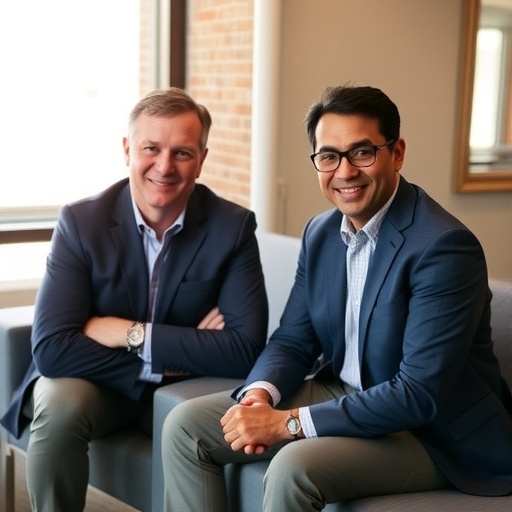In recent years, the significance of mentorship in medical fields has garnered increasing attention, particularly in specialties such as radiology, where complexity and technological advancement are rapidly evolving. A recent study led by Huang, Kriss, and Foust, published in the Pediatric Radiology journal, delves into the concept of “cascade mentorship”—an innovative approach designed to enhance the mentoring relationship. This model not only aims to benefit mentees but also focuses on enriching the mentor’s experience, thereby creating a more robust educational environment.
Cascade mentorship is predicated on the notion that mentoring is not a unidirectional process; rather, it is dynamic and multiplies in value when mentors actively engage in the developmental paths of their mentees. The study illustrates that this layered approach enables mentors to foster skills in multiple individuals at various stages of their careers. By doing so, mentors contribute to a developing network of professionals who can share knowledge, rooted experiences, and innovative practices.
The authors of the study argue that traditional mentorship models, while valuable, often fall short in addressing the diverse needs and aspirations of modern medical professionals. In their research, they found that mentees frequently seek more than just knowledge transfer; they are in search of relational support, career guidance, emotional resilience, and networking opportunities. In a field as demanding as radiology, where burnout and job dissatisfaction can be prevalent, addressing these multidimensional needs is vital for professional growth and retention.
An intriguing point highlighted in the study is the impact of mentorship on academic productivity. Cascade mentorship has been shown to correlate significantly with higher rates of publications and presentations in professional conferences among mentees. This momentum not only enriches the mentee’s CV but also augments the mentor’s own career trajectory as their mentees thrive in their respective fields. The network created through effective mentorship can lead to collaborative research projects and innovative clinical practices, thereby benefiting the larger medical community.
Further emphasizing the continuous cycle of mentorship, the research illustrates how mentees, after receiving guidance from their mentors, can step into mentorship roles themselves, thus perpetuating the process. This cyclical model fosters a culture of sharing and collaboration, serving to build a solid foundation for future healthcare professionals who are not only skilled in their specialties but also equipped with the soft skills necessary for effective team interaction.
Moreover, the findings suggest that the success of cascade mentorship relies heavily on the mentor’s ability to engage meaningfully with their mentees. Effective communication, active listening, and genuine interest in the mentee’s goals are paramount. Mentors are encouraged to adapt their mentoring style to fit the individual needs of their mentees, creating a personalized approach that can significantly enhance the mentoring experience. A one-size-fits-all model is increasingly seen as insufficient in a world characterized by diversity in learning styles and career aspirations.
In analyzing the outcomes of cascade mentorship, the study identifies various metrics of success, including the development of specific skills, increases in confidence levels, and enhanced decision-making capabilities among mentees. These metrics can often be quantified through pre- and post-mentorship assessments, illustrating the tangible benefits of investing time and resources into mentorship programs.
Furthermore, the research highlights the role of technology in facilitating effective mentoring relationships. With the advent of telemedicine and online educational platforms, mentors and mentees can connect regardless of geographic limitations. Virtual meetings, webinars, and online resource sharing are changing the landscape of mentorship, making it more accessible and diverse. This flexibility not only accommodates busy professionals but also opens opportunities for cross-institutional mentorships that can enrich a mentee’s experience.
The emotional aspect of mentorship cannot be overlooked. The study indicates that supportive mentoring relationships can bolster resilience and emotional well-being among mentees, equipping them with tools to navigate the challenging aspects of their professions. This emotional backing is particularly crucial in high-pressure fields like radiology. Mentors who actively demonstrate empathy and offer support create safe environments where mentees feel encouraged to voice their uncertainties and navigate their career paths confidently.
Another essential consideration presented in the study is the need for ongoing evaluation and adaptation of mentorship programs. New research findings and changes in the healthcare landscape, particularly post-pandemic, necessitate that mentoring strategies remain fluid. The authors advocate for mentorship programs to regularly assess their effectiveness and evolve to meet the changing needs of both mentors and mentees to ensure a meaningful and impactful experience.
As cascade mentorship gains traction, it is essential to foster a culture of recognition within medical institutions. Celebrating the achievements of mentors and their mentees can inspire others to engage in similar mutually beneficial mentorship arrangements. Recognition programs can channel attention toward the successes borne of these relationships and advocate for the establishment of great mentoring networks across specialties.
In conclusion, cascade mentorship represents a paradigm shift in how mentoring relationships are conceived and executed in the field of radiology. By recognizing and enhancing the interconnectedness of mentors and mentees, this approach seeks to transform the educational and professional landscape, ultimately leading to a more competent and satisfied cadre of healthcare professionals. As the study by Huang et al. articulates, investing in mentorship is not merely an academic endeavor but a vital strategic initiative that will shape the future of radiology and other medical fields for years to come.
Subject of Research: Cascade Mentorship in Radiology
Article Title: Cascade mentorship in radiology: increasing the impact of the mentoring relationship
Article References:
Huang, J., Kriss, S., Foust, A. et al. Cascade mentorship in radiology: increasing the impact of the mentoring relationship.
Pediatr Radiol (2025). https://doi.org/10.1007/s00247-025-06444-7
Image Credits: AI Generated
DOI: https://doi.org/10.1007/s00247-025-06444-7
Keywords: Cascade mentorship, radiology, mentoring relationships, professional development, healthcare education.
Tags: benefits of mentorship in medical educationcascade mentorship in medical fieldsdynamic mentoring models in healthcareenhancing mentor-mentee relationshipsevolving needs of medical professionalsinnovative mentoring approaches in radiologymentorship strategies for career growthnetworking in medical mentorshipprofessional development in radiologyradiology mentorship programsrelational support in medical mentorship





